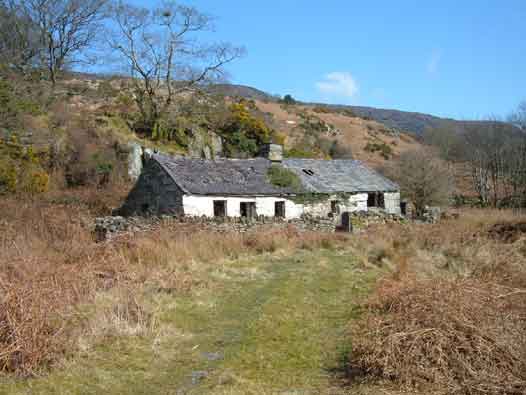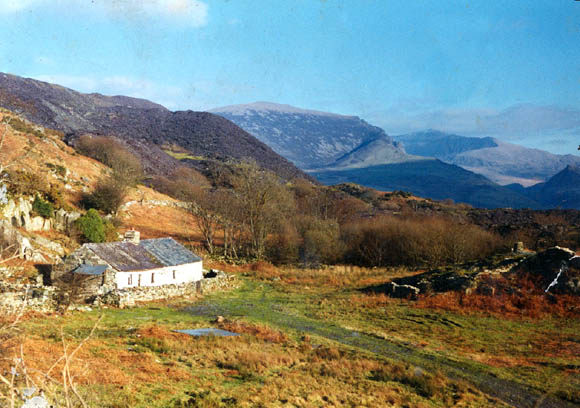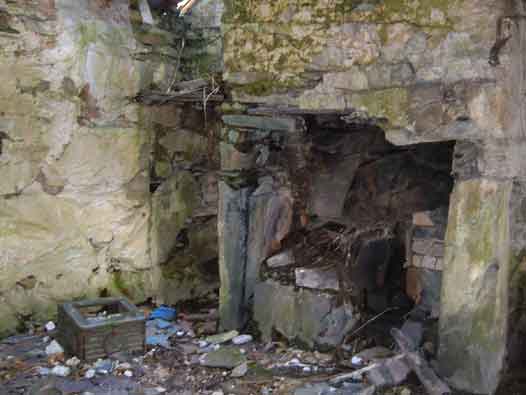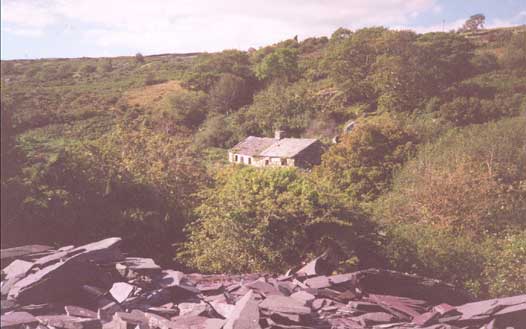Ty'n y Fawnog ~ April
2006
by David Tudor
Owen

Image: Ty'n y Fawnog.
Out on the edge of Talysarn is a derelict farmhouse
called Ty’n y Fawnog, inhabited only by sheep
and accessible only on foot. This house was home to
at least one 19th century family who lived hard lives
sustained by devout Methodism.
Robert Owen, quarryman and farmer, and his wife Catherine,
lived in Ty’n y Fawnog with their five sons,
from about 1822 up to her death, in about 1842. Robert
then remarried and emigrated to America, along with
the two youngest boys in 1843. Growing up in Ty’n
y Fawnog in the 1820s and 30s, the boys did not have
daily education, and had to start work in the slate
quarries as soon as they were old enough. The family
did have a servant so were obviously not poverty stricken.
One of the daughters of the notable Methodist minister
the Rev. John Jones is quoted in a book published in
1907 (Biography and Sermons of Rev. Robert Owen by
the Rev. John Owen published by Hugh Evans, Liverpool
1907). She describes Ty’n y Fawnog as a "little
small-holding, on the side of Cilgwyn Mountain, the
western side of Talysarn". She said, "I
don’t know of one house in the district that
I liked going to as a child more than Ty’n y
Fawnog. I have been there scores of times. An old plain
house, a low door to go into, and two windows each
side of it, and the cowshed under the same roof. It
had been built on a spot under the shadow of the hills
that were nearby, on a field of peat."

Image: Ty'n
y Fawnog on a glorious day.
The family were devout Methodists, and worked hard.
Early in the morning, the boys would see to the cattle
before eating their breakfast by candlelight. A fervent
prayer from their father for God to take care of them
all, and then the boys would set off with him to his
work in the quarry, "with his dinner and the
children’s in a clean wooden basket and with
milk in a can or in a sparkling clean pitcher." The
father ran temperance classes and youth activities
in the chapel. He was well known for ‘clouting
boys’ who misbehaved. The family risked their
lives regularly to get to chapel; they had to "go
along the most intricate route, past one of the deepest
quarry pits of the district at that time, and they
had to do this with a lantern on dark nights, to cross
the pile of rubble to arrive at the place of worship." These
days, the path steers well clear of the flooded quarry
below the house.
One son – Hugh – died in a quarry accident,
but the two sons who stayed in Talysarn when their
father emigrated did well for themselves. Owen Rogers
became a quarry manager and flour merchant, and Robert
was to become a well-known Calvinist Methodist preacher
- the Rev. Robert Owen (Tŷ Draw). They were both
still living in Ty’n y Fawnog at the time of
the census in 1851, but by 1861, the Owen family had
moved out, replaced by David and Anne Williams and
their three daughters, who were living
and farming the 28 acres
of Ty'n Fawnog. By 1871, Catherine Rowlands and her
sons, Richard and John,
and a lodger, Robert Roberts had taken over the house
and the Rowlands'
family remained in it until at least 1911.

Image: The derelict fireplace at Ty'n
y Fawnog.

Image: Ty'n
y Fawnog from afar.
With thanks to Mrs Jones of
3 Station Road, Talysarn |